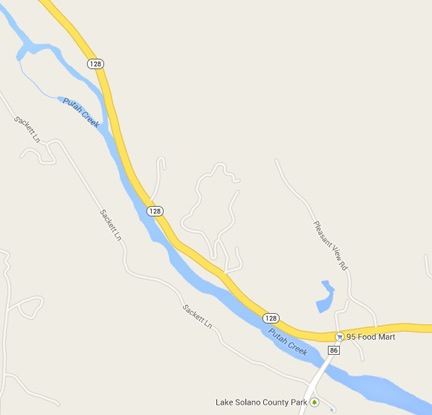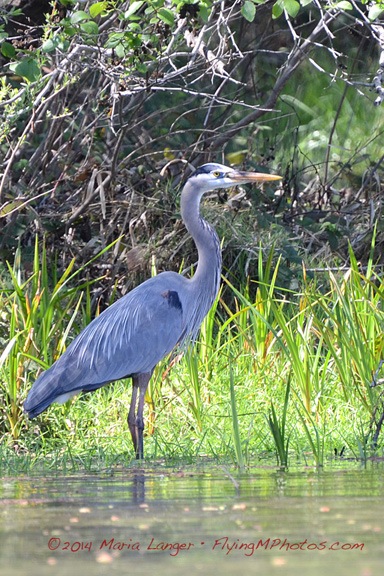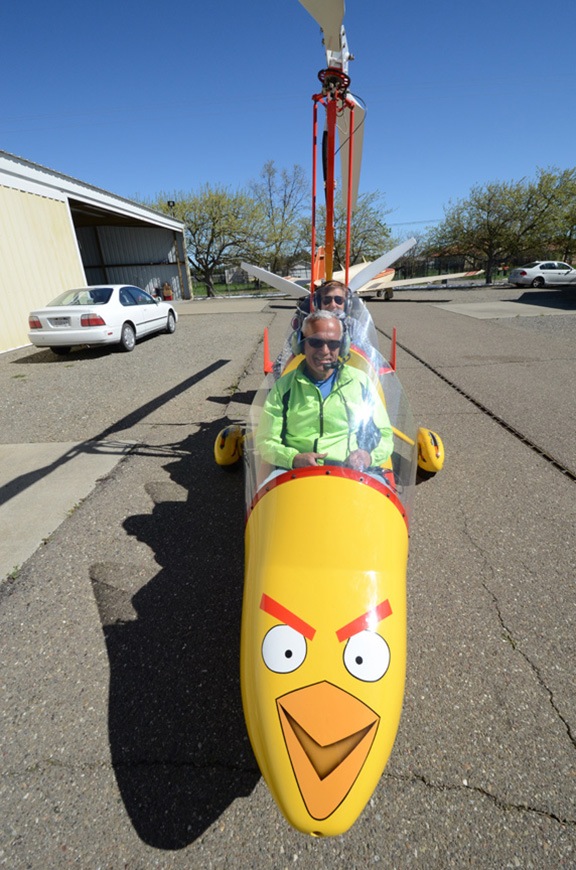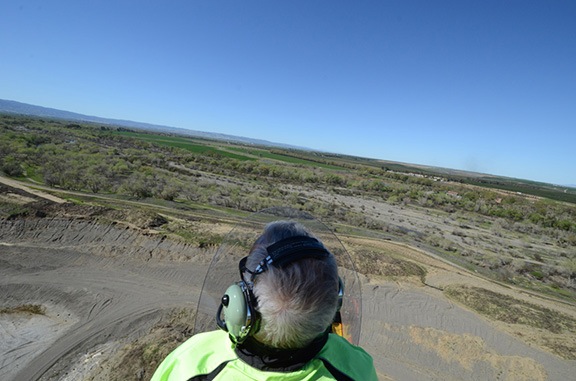It’s more than just an upper-body workout.
On Thursday, I took my kayak out to Lake Solano near Winters, CA.
I blogged a little about this lake last week — I’d driven through the campground there and was amazed to see dozens of peacocks strutting around. I took lots of photos.

The area of Lake Solano where I paddled on Thursday.
The lake isn’t anything to brag about. Really, it’s more of a very long, narrow pond. When I mentioned it to a local friend, his response was “What lake? Never heard of it.” In fact, Google Maps doesn’t even refer to it as Lake Solano — instead, it’s just Putah Creek.
What attracted me to it was the calm, smooth water. An easy paddle — something I was really looking for after my 9-mile paddle last Saturday on the American River. (If you’re wondering why I didn’t blog about that trip, it’s because I’ve been just too darn busy to blog most of the things I do these days. Maybe if I ever slow down.) Secondary was the wildlife — including birds — that I expected to find along the way. I’ve bring my camera and turn it into a “Photo Paddle.”
The weather couldn’t have been better. Temperature in the low 70s and not a cloud in the sky. I put on my swim shorts and a tank top, packed a picnic lunch that included a salad, some almonds, some string cheese, and a bottle of icy water. I grabbed Penny’s life jacket and the waterproof case I used to keep my phone safe on the water. Then I loaded up the kayak into the back of my truck and headed out. It was around noon.
I took the freeway to route 128 and headed west through Winters, stopping only long enough to put some fuel in the truck. A short while later, I was pulling into the parking lot for the day use area near the bridge, ignoring the signs that said “No Pets Beyond this Point.” After all, it wasn’t as if Penny and I were going to have a picnic in the park. We were there for the boat ramp.
I backed the truck down the narrow ramp, pulled down the tailgate, and slid my kayak into the water. I put the picnic lunch in the watertight compartment and my bottle of water in the cupholder in front of my seat. I carefully stowed my camera bag on the floor of the boat, shoved up toward the bow where it was more likely to stay dry. Then I put Penny’s life jacket on her, fastened her leash to it, and put her in the boat. I attached the leash to the elastic tie-downs on the front of the boat and left her to move the truck. I parked it in the shade, locked it up, and returned to the boat.
I decided not to wear my life jacket, although I did bring it with me as required by one of the many signs in the park. I’d use it as a backrest. The water was calm and smooth and not very deep. The possibility of me flipping the boat and then being unable to keep my head above water was pretty much nil.
I pushed the boat out a little and climbed on board. I settled myself into the comfy seat, put my feet on the supports on either side, and paddled out into the lake. After fiddling with my camera while the boat drifted in lazy circles, being pushed by a mild current and light winds, I started paddling upstream (northwest) with Penny sitting on one of her dog beds fastened to the bow.
I started seeing photography subjects immediately. The first was a heron, which I’ve always had trouble photographing. The birds are extremely spooky; it’s next to impossible to get anywhere near one. Fortunately, I had my 300mm stabilized lens. I managed to frame a few shots before it took off.

This great blue heron was standing in deep water when we drifted by.

Another heron along the shore of Lake Solano.
Later on, I shot another one on the other side of the lake. As I expected, he didn’t wait around. If it weren’t for the 300mm lens, I never would have captured these images. I really like that lens for wildlife photography.

Although I didn’t capture an image of the heron taking off, I did get this shot of it flying away. (Frankly, I’d rather look at wildlife than photograph it.)
After that, it was mostly various types of ducks.

A pair of Barrows Goldeneye ducks. IDed by my friend Dale.

A pair of Common Merganser ducks. Also IDed by Dale.

A female Common Merganser.
Paddling was pretty easy, even though I was moving upstream. There was a little bit of a breeze behind me and the current, for the most part, wasn’t even noticeable. I took my time, pausing plenty of times for rest and to just look around me or snap photos.
Eventually, we reached the lower end of a long island (see map above). I brought the boat up on a gravelly shore and stepped out. Penny jumped out and I unfastened her leash. It was a nice place to stop for lunch — sunny and quiet with a nice view down the lake. I settled down with my picnic lunch of salad, cheese sticks, and almonds while Penny sniffed around the island and nibbled goose poop. (Of course, that could explain why her digestive system hasn’t been quite right since then.)

I sat on the shore and looked down the lake while eating lunch.
After lunch, we continued upstream on the southwest side of the island, which seemed a bit shadier. Since spending the winter in Wenatchee, I’ve lost most (but fortunately, not all) of my year-round tan and I’m a bit susceptible to sunburn. The creek got narrower as I paddled upstream and the current became noticeable. I kept going, paddling around fallen trees and rocky sandbars.
Finally, we reached a place where there were “rapids” — if I could use so strong a word — as water rushed over rocks. I suspected I was pretty close to the top end of the island and got the idea that I could sort of portage the boat up the rapids by dragging it and then come back down the other side. I climbed out and gave it a try. I got about 100 feet upstream — far enough to look beyond to see whether I was near where the water split around the island. It didn’t look as if I was. So I turned the boat around, got back in, and paddled through the rapids back downstream.

Here’s a GoPro BowCam image as we left the “rapids” on our way back downstream. (You didn’t think I’d do this trip without a GoPro on board, did you?)
For the most part, Penny was pretty comfortable up on the bow, taking in the view. After her initial frustration of seeing so many ducks so close up and not being able to get them, she settled down. She took great interest in the weeds and sometimes river rocks right below the surface. She may even have seen a fish or two — she certainly reacted as if she’d seen something interesting.

My dog will go anywhere with me.
The paddling was easy in the smooth, calm water with a hint of a current behind us. We were back at the bottom end of the island in no time. With no hurry to be anywhere else, I turned up the northeast side of the island and started paddling upsteam again.

Here’s another BowCam shot. The water was mirror smooth in some places.

There was more to this scene than just a pair of Canada geese.
I shot some more photos along the way. The Canada geese shot was particularly memorable. As I paddled up the northeast side of the island, I saw a goose standing alongside the creek. I got my camera ready as the boat drifted upstream. That’s when I realized that there were two geese standing side by side. I snapped two good shots of them and then took a moment to just look at them. That’s when I saw the deer behind them, moving away into the brush. I’d been so focused on the geese that I’d missed the deer. And I’d been so surprised to see the deer that I didn’t react with my camera. Photo op lost, but that’s okay.
All of the birds — except the geese, of course — were spooky. Any time I got close, they’d take to the air. As I paddled up the side of the island, I got rather close to a pair of ducks. The GoPro captured footage of them taking off.

A screen grab from the BowCam video. The ducks were airborne in less than 2 seconds.
I reached the rapids at the top end of the island and turned around without stopping. By then, I was ready to go back.
Later, back in the main body of the lake, I managed to capture some images of turtles, sunning themselves on logs. Like the birds, they were pretty spooky and I could only snap photos from quite a distance away.

Bet you didn’t know turtles could climb trees. Per my friend Terry, this is a red eared slider.

This great egret was fishing across the lake from the boat ramp.
I caught sight of a great egret not far from the boat ramp and paddled over as close as I dared to get one final photo.
Afterwards, I paddled back to the boat ramp and brought the boat onshore. I fetched the truck, loaded up the boat, and climbed into the cab.
I took one quick ride through the campground to look at the peacocks again before heading back to our temporary home.
It had been a nice, relaxing day out. According to my GPS track, I’d paddled about four miles. Best of all, I had some really nice photos to share from my day out.










 And that’s when I realized that we were pretty much surrounded by peacocks and peahens. They were strutting through the empty campsites, along the road, and into the brush. Occasionally, one would let out a
And that’s when I realized that we were pretty much surrounded by peacocks and peahens. They were strutting through the empty campsites, along the road, and into the brush. Occasionally, one would let out a 







